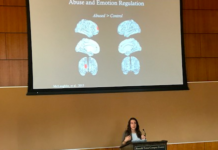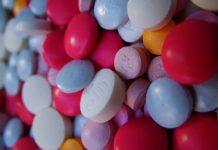Ecological Trauma and Common Addiction
From Rex Weyler: Breaking the cycle of abuse, trauma, and addiction requires a radically new relationship with society and with the more-than-human world.
“You May Be On Prozac But Not Know It”
"Within the last decade," reports The Alternative Daily, "traces of pharmaceuticals have been reported in the water cycle, including surface waters, wastewater, groundwater and to...
The Importance of Recovering Our Feeling Nature | Pete Walker, MFT
From The Tao of Fully Feeling: Individuals who choose or are coerced into only identifying with "positive" feelings often wind up in an emotionally lifeless middle ground – bland, deadened, and dissociated in an unemotional "no-man's-land."
“Scientists Discover A New Link Between The Brain And The Immune System”
-io9 discusses the recent discovery of a new link connecting brain function to the gut microbiome and immune system in humans.
“Depressing Truth About Treating Depression in the Young”
An Irish journalist poses as a student and receives seven prescriptions for antidepressants from seven psychiatrists, with little or no information either taken or...
“The Dangerous Ideal of Mental Health”
"Today... mental health is increasingly understood as a positive state: as something to aspire to. Led by the new academic field of positive psychology...
The Neural Signature of Community Violence
From UNDARK: "In our data, we found that witnessing violence in early adolescence predicted smaller volumes of both the hippocampus and amygdala in this...
Off-Label Prescribing Increases Risk of Adverse Effects
The first systematic investigation of the adverse effects associated with prescribing drugs “off-label” found that the common practice of using drugs for conditions for which they are not approved increases the risk of adverse effects.
Psychiatry and the Shores of Social Construction: Sami Timimi, MD
From Psychiatric Times: Awais Aftab interviews Dr. Sami Timimi on his latest book, Insane Medicine: How the Mental Health Industry Creates Damaging Treatment Traps and How You Can Escape Them.
Best Selling Prescription Drugs in the World
-On a list of prescription drugs that generated the most in global sales dollars in 2014, the antipsychotic Abilify was number twelve at $5.7 billion.
How Neglect and Abuse Change Children’s Brains
From the Center for Health Journalism: Different types of childhood adversity shape the developing brain in distinct ways and need to be addressed accordingly. While...
Groundbreaking Program Supports People Without Force in Belgium
From Human Rights Watch: "There are only two rules...We don’t abandon someone, and we don’t force someone. When people call us, they’re a citizen. Not a sick person, not a patient, not a user, not a client.”
Psychiatry is a Disaster Area in Healthcare That Needs Attention
In this piece for The BMJ, Dr. Peter Gøtzsche points out several of the major problems with the drug-based paradigm of psychiatric care as well as...
“Nature and Nurture: Human Brains Evolved to be More Responsive to Environmental Influences”
"We found that the anatomy of the chimpanzee brain is more strongly controlled by genes than that of human brains, suggesting that the human brain is extensively shaped by its environment no matter its genetics," said Aida Gómez-Robles, postdoctoral scientist at the GW Center for the Advanced Study of Human Paleobiology and lead author on the paper. "So while genetics determined human and chimpanzee brain size, it isn't as much of a factor for human cerebral organization as it is for chimpanzees."
Have We Found The “Overhype Gene”?
-John Horgan criticizes psychiatrist Richard Friedman's effusive portrayal of a study that allegedly identified the "feel-good" gene in humans.
Nature Is Healing: Some Canadian Doctors to Prescribe National Parks Passes to Patients
From National Parks Traveler: Evidence shows the health benefits of nature time range from better immune function and life expectancy to reduced risk of heart disease, depression and anxiety.
1BoringOldMan on Misusing the Tools of Clinical Neuroscience
1BoringOldMan picks up where he left off two years ago - critiquing Robert Gibbons' misuse of statistical analysis to claim that antidepressants were both...
Government Issues Warning About Pill Pushed on the Elderly
From CNN: The US government is warning insurance companies to be on the lookout for suspicious prescriptions of a drug being used in nursing...
“Colorado Responds Slowly to Psychotropic Drug Use Among Foster Kids”
The Denver Post writes "Colorado officials have known since at least 2007 that prescriptions and dosage levels of psychotropic drugs — which also include antidepressants, mood...
“Choosing Wisely: Changing Clinicians, Patients, or Policies?”
In the JAMA Forum, Diana Mason, President of the American Academy of Nursing, discusses the "Choosing Wisely" campaign and its efforts to get physicians...
“Not Yet Kicked: The Consequences of Big Tobacco’s Targeting of Mentally Ill People”
“Two big lies—that smoking relieves the symptoms of psychosis, depression and anxiety and that mentally ill people have a special immunity to tobacco-related diseases—were...
Psychiatrist Arrested for Death of Patient
From The Times of India: A psychiatrist from the Uma Nalini Mary Clinic and Research Institute was recently arrested on charges of homicide of a middle-aged patient....
Charity: Hundreds of Thousands With Mental Health Conditions Being Chained
From The Guardian: “Shackling people with mental health conditions is a widespread, brutal practice that is an open secret in many communities,” said Kriti Sharma of Human Rights Watch.
Going Off Antidepressants – Take Time to Quit
From Radio New Zealand: "It’s only when you go down into much smaller doses that...the withdrawal symptoms really start to become more evident and more severe."
“European Regulator Recommends Suspending Numerous Drugs Over Clinical Trial Problems”
Pharmalot’s Ed Silverman reports that a number of generic drugs, sold by Novartis and Teva Pharmaceuticals, may be pulled off of the shelves after...






















